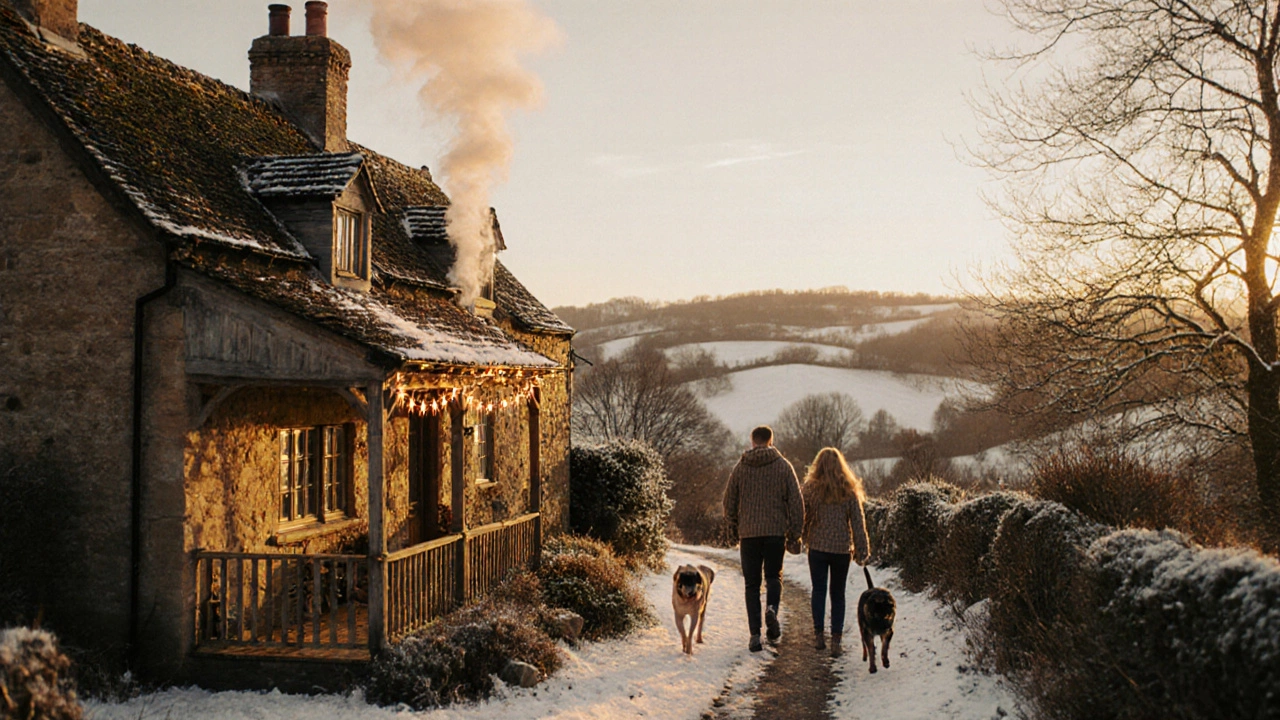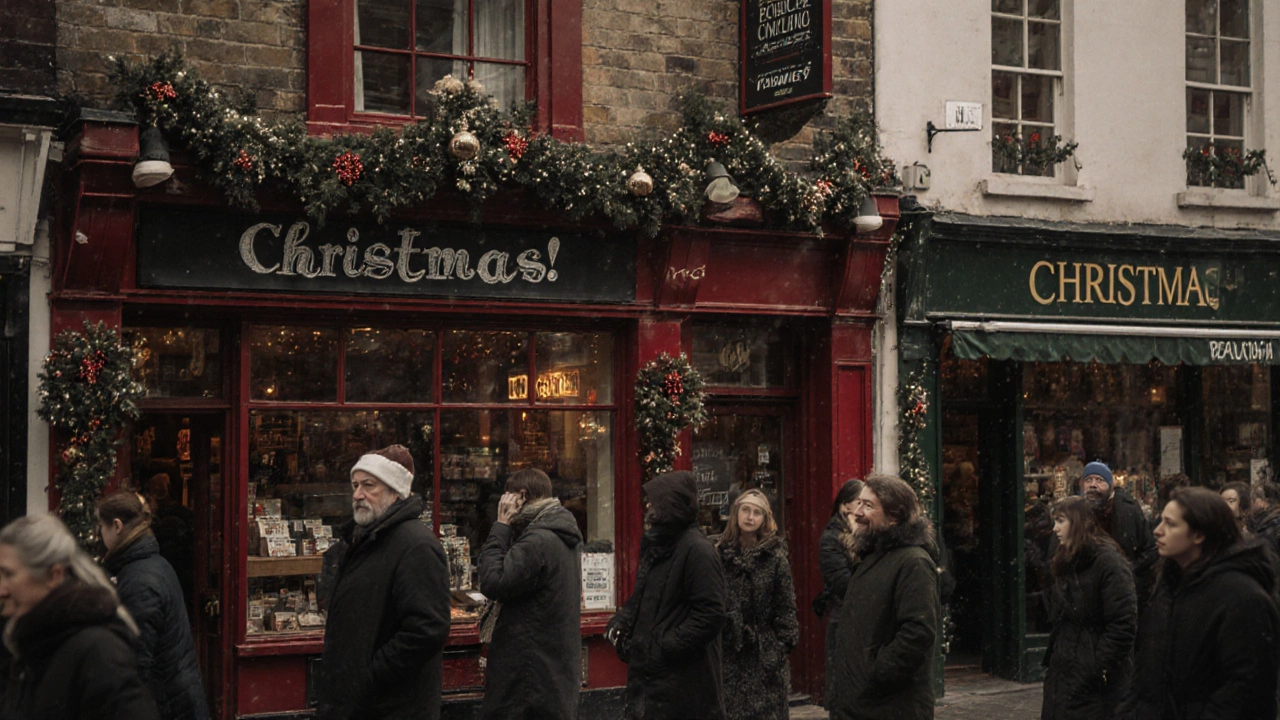When the days get short and the mist rolls in off the Avon, Brits don’t just say happy holidays-they wrap it in tea, woolly socks, and a healthy dose of irony. You won’t hear many people in Bath or Belfast blaring ‘Happy Holidays!’ like they do in American malls. It’s not that they don’t celebrate. They do. But the way they talk about it? That’s where the real charm lives.
‘Happy Holidays’? Not Really
If you walk into a corner shop in Manchester or a pub in Edinburgh and say ‘Happy holidays!’ with a big smile, you’ll get a raised eyebrow and maybe a quiet chuckle. Brits don’t use that phrase much. It sounds too American. Too corporate. Too much like a supermarket sign plastered over a pile of overpriced mince pies.
Instead, you’ll hear:
- ‘Merry Christmas!’-used from late November right through to Boxing Day
- ‘Happy Christmas!’-especially in Scotland and parts of the North, where ‘Merry’ feels a bit too loud
- ‘Have a good one!’-a catch-all for anyone who’s not sure if you’re celebrating Christmas, Hanukkah, or just the end of the work year
- ‘See you in the New Year!’-often said with a wink, meaning ‘I hope you survive the in-laws’
Even ‘Happy Holidays’ as a plural? That’s rare. Most Brits don’t think of the winter break as a string of separate holidays. It’s one long stretch: Christmas, New Year’s Eve, Boxing Day, and sometimes Epiphany. It’s all just ‘the holidays’-no need to label each day.
Why ‘Happy Holidays’ Feels Foreign
It’s not just about language. It’s about culture. The UK doesn’t have a big ‘holiday season’ marketing machine like the US. There’s no Black Friday frenzy that starts in October. No Santa parades in every town square. Christmas in Britain is quieter, more personal. It’s about family, roast dinners, and the Queen’s speech (or now, the King’s).
And here’s the kicker: most Brits don’t even leave home. Staycations have exploded since 2020. In 2024, over 18 million UK residents took a holiday within Britain-up from 11 million in 2019. People are choosing cozy cottages in the Cotswolds, seaside lodges in Cornwall, or even just a B&B in York over flying to Spain or Portugal.
That shift changed how people talk about the season. Instead of ‘I’m going away for the holidays,’ you hear: ‘I’ve booked a week in a log cabin near Lake Windermere.’ Or: ‘We’re doing the whole Christmas thing at my mum’s, then we’re going to the seaside on New Year’s Day.’

How Brits Really Talk About Winter Breaks
Here’s what you’ll actually hear from people you know:
- ‘We’re staying in. Got the turkey, the wine, and the telly sorted.’
- ‘The kids are off school, so we’re doing the Christmas lights tour in London.’
- ‘We’re doing a pub crawl on New Year’s Eve-no travel, no stress.’
- ‘My brother’s coming over for Boxing Day. We’ll watch the football, eat leftovers, and complain about the weather.’
Even when people do travel, they’re not talking about ‘holidays’ in the tourist sense. They’re talking about where they’re going and what they’re doing. ‘We’re in the Lake District’ sounds more natural than ‘We’re on holiday.’
And if someone asks you how your holiday was? You won’t say ‘It was happy.’ You’ll say:
- ‘It was lovely, thanks.’
- ‘We had a proper break.’
- ‘It was quiet-just what we needed.’
- ‘The kids didn’t scream once. Miracle.’
Staycations Are the New Normal
Since 2022, UK staycations have become more than a pandemic trend-they’re a lifestyle. People are rediscovering their own country. The Peak District, the Welsh coast, the Scottish Highlands-these places are packed in December. Bookings for holiday cottages in Devon and Yorkshire are up 40% since 2021.
Why? Because flying’s expensive. Flights to the Mediterranean are often £400+ round trip. Train tickets to Scotland? £120. A week in a cottage with a wood burner and a view of the hills? £600. And you don’t need a passport.
Plus, there’s a quiet pride in it. People feel like they’re supporting local businesses-pubs, farms, B&Bs, independent gift shops. It’s not just about saving money. It’s about connection.
My neighbor in Bath booked a cottage in the Forest of Dean last year. She said: ‘I’ve never been there. I thought I’d never leave the house for Christmas. But we lit candles, made mince pies, and walked through the woods. It felt like the first real holiday I’ve had in years.’

What to Say Instead of ‘Happy Holidays’
If you’re visiting the UK this winter-or just chatting with someone from here-here’s what works:
- ‘Merry Christmas!’ - Safe, warm, universally understood.
- ‘Happy Christmas!’ - Slightly more British, especially if you’re in Scotland or the North.
- ‘Have a lovely break!’ - Perfect for anyone who’s not celebrating Christmas.
- ‘See you in the New Year!’ - Casual, friendly, and common in workplaces.
- ‘Hope you get some peace and quiet!’ - A bit cheeky, but many Brits will appreciate the honesty.
Avoid: ‘Happy Holidays!’ unless you’re in a very Americanized setting-like a chain hotel in Heathrow or a Starbucks in London. Even then, you’ll probably get a polite nod, not a smile.
The Real Meaning Behind the Words
Behind all these phrases is something deeper: a cultural preference for understatement. Brits don’t shout joy. They whisper it. They show it through actions-making a cup of tea for someone who’s had a long day, leaving a plate of mince pies on the doorstep, or just sitting in silence watching the snow fall.
When you say ‘Happy holidays’ in the UK, you’re not just wishing someone well. You’re asking them to slow down. To be present. To enjoy the quiet moments. That’s what staycations are really about-not the destination, but the pause.
So next time you’re in a British home this winter, don’t worry about saying the ‘right’ thing. Just say ‘Merry Christmas’ if it feels right. Or don’t say anything at all. Hand them a hot drink. Sit by the fire. Let the silence speak.
That’s the British way.
Do Brits say ‘Happy Holidays’ at all?
Rarely. ‘Happy Holidays’ sounds American and overly formal. Most Brits use ‘Merry Christmas!’ or ‘Happy Christmas!’ instead. In mixed or secular settings, they might say ‘Have a good one!’ or ‘See you in the New Year!’
Why are staycations so popular in the UK?
Staycations are popular because they’re affordable, stress-free, and support local economies. With flights expensive and travel uncertain, Brits are choosing cozy cottages, seaside lodges, and countryside B&Bs. Over 18 million people took a UK staycation in 2024-up from 11 million in 2019.
Is ‘Happy Christmas’ only used in Scotland?
No. ‘Happy Christmas’ is used across the UK, but it’s more common in Scotland, Northern Ireland, and parts of northern England. In the South, ‘Merry Christmas!’ is more typical. Both are correct-‘Happy Christmas’ just sounds a bit more traditional and understated.
What’s the best way to wish someone well during the UK winter break?
Say ‘Merry Christmas!’ if you know they celebrate it. If you’re unsure, go with ‘Have a lovely break!’ or ‘Hope you get some rest!’ These phrases are warm, inclusive, and perfectly British-no need for grand declarations.
Do Brits celebrate holidays other than Christmas?
Yes. Many celebrate Hanukkah, Kwanzaa, or secular New Year’s. Boxing Day is a national holiday. Some observe Epiphany or Hogmanay (Scottish New Year’s). But Christmas still dominates the cultural calendar. Most people take time off between December 24 and January 2, regardless of their beliefs.
